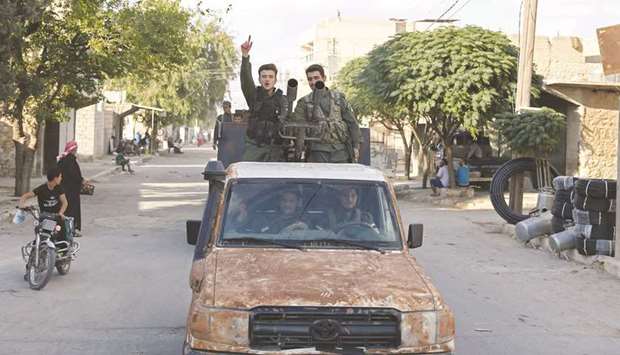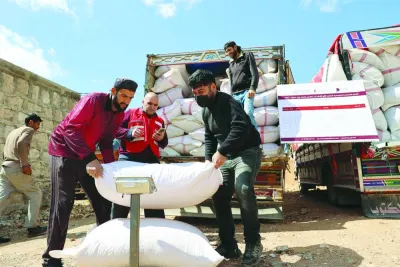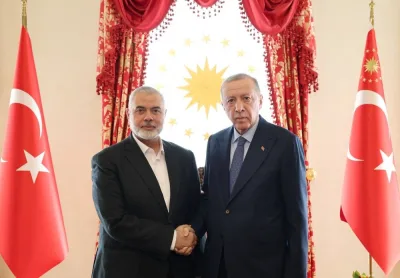France is one of Washington’s main allies in the US-led coalition fighting Islamic State in Syria and Iraq, with its warplanes used to strike militant targets and its special forces on the ground co-ordinating with local Kurdish and Arab fighters.
The United States began pulling troops back from the northeast Syria border yesterday, in a move US President Donald Trump hailed as a bid to quit “endless wars”. The move appeared to leave allies scrambling to assess the impact.
“We are going to be extremely careful that this announced disengagement from the United States and a possible offensive by Turkey does not create a dangerous manoeuvre that diverts from the goal we all pursue — the fight against Islamic State — and which is dangerous for the local population,” Florence Parly told reporters in northern France.
“We must be extremely vigilant that a manoeuvre of this kind can not, contrary to the goal of the coalition, strengthen Daesch (Islamic State) rather than weaken it and eradicate it,” she said.
French officials have said in the past that a US withdrawal would force Paris to also draw back its troops and after a similar an announcement by Trump in January, French President Emmanuel Macron had claimed he had convinced Trump to change his mind.
France is especially sensitive to the Islamic State threat after several major deadly attacks on its soil and officials believe the militant group continues to pose a threat.
Hundreds of French nationals joined the group in Syria and are currently being held in Kurdish-controlled camps.
With an impending Turkish attack, the Kurds could be forced to reduce security at those camps.
“Terrorist fighters in detention, including those of foreign nationality, must be tried in the place where they committed their crimes,” France’s foreign ministry spokeswoman told reporters, warning Ankara against a unilateral operation.
“This judgment and their secure detention in north-east Syria are a security imperative to prevent them from reinforcing the ranks of terrorist groups,” she added.
Meanwhile, the Pentagon said yesterday the United States does not endorse a threatened Turkish military invasion of northern Syria, and cautioned that such a move risked destabilising the region.
The warning came after President Donald Trump announced late on Sunday a pullback of US troops from the Syria-Turkey border, seen as paving the way for the offensive.
Defence Secretary Mark Esper and Joint Chiefs Chairman Mark Milley told their counterparts in Ankara that “unilateral action creates risks for Turkey,” Pentagon spokesman Jonathan Hoffman said in a statement.
“The Department of Defence made clear to Turkey — as did the president — that we do not endorse a Turkish operation in Northern Syria,” he added.
Hoffman said the US, along with Nato allies and coalition partners, would reiterate to Ankara “the possible destabilising consequences of potential actions to Turkey, the region, and beyond.” Trump unexpectedly announced the pullback of US forces.
It sparked concerns that the Kurdish-led Syrian Defence Forces would be forced to abandon some 10,000 captured Islamic State fighters they have been holding, potentially allowing the group to re-establish itself.
If Turkey does invade the area, Hoffmann said, it “would be responsible, along with European nations and others, for thousands of ISIS fighters who had been captured and defeated in the campaign (led) by the United States.”
UN APPEAL TO PROTECT CIVILIANS
Civilians must be spared in any Turkish military operation in northeast Syria, where the United Nations hopes that mass displacement and Srebrenica-like killings can be prevented, a senior UN aid official said.The United Nations currently delivers aid to 700,000 people in the densely-populated northeast region of 1.7mn.
It has drawn up contingency plans to reach people who might flee south with food and medical aid, said Panos Moumtzis, UN regional humanitarian co-ordinator for the Syria crisis.
“Any (military) operation that takes place at the moment has to take into account to ensure that we don’t see any further displacement,” Moumtzis told reporters in Geneva.
”We are hoping for the best but preparing for the worst”. Moumtzis, asked about the Turkish offensive against Kurdish-led forces and the ‘safe zone’ idea, said: “I really cannot talk about what type or how would the intervention be or how extensive it is going to be in terms of the military operation that will take place.
“For us as the United Nations, the safe zone concept is one that we have a bitter history (with) and actually we never promote or encourage.
We don’t think it is something that had worked for the United Nations, keeping in mind Srebrenica and what had happened in the past,” he said.
He was referring to the slaughter by Bosnian Serb troops of 8,000 men and boys in 1995 in a UN-declared “safe zone” where Dutch peacekeepers were unable to protect civilians.
“We understand that there is going to be some kind of security zone which will be very specifically targeted to a military operation or to an area where there has to be some clearance,” Moumtzis said.
“So our hope is that there will be full co-operation by all to make sure that it happens as smoothly as possible, without resulting in displacement, and ensuring protection of civilians, ensuring that the basic principles of humanity will be respected on the ground.”
The United Nations is in contact with all sides to explain where clinics, schools, water points, markets and residential areas are located, and to urge them “to stay away from civilian people”, Moumtzis said.



